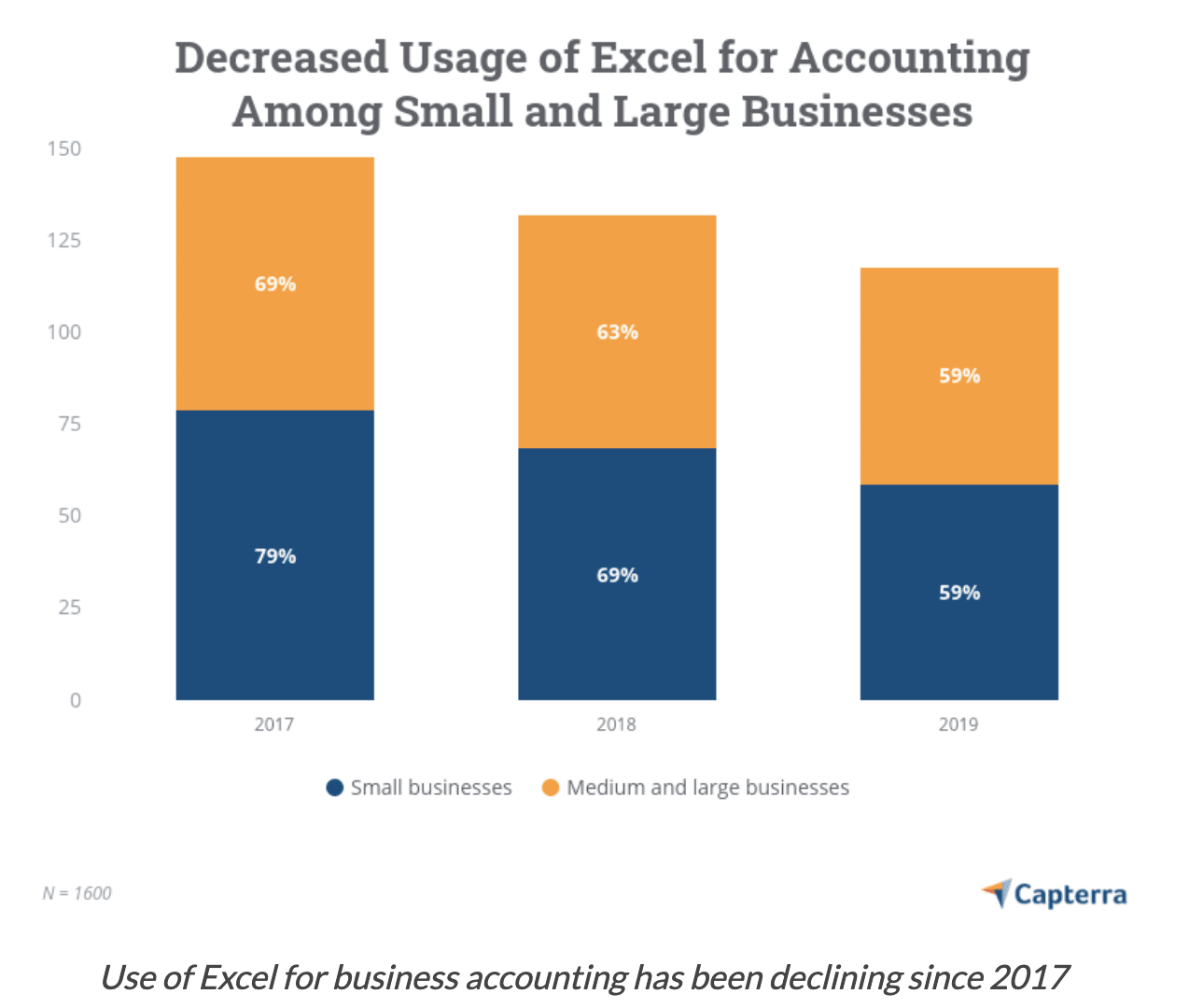
Microsoft Excel was first released in 1985, and has steadily grown to become what is probably the most important business application in the world. Given that more than 80% of businesses use Excel for planning, budgeting and forecasting, it is safe to say that Excel is a powerful tool.
Over the years, Excel has evolved to meet business needs becoming the to-go tool for a variety of use cases worldwide. Tracking sales trends, analyzing competitors, creating custom reports, book-keeping, budgeting, tracking stock prices, scheduling are just some of the many applications- Excel is entrenched in business processes.
Why is Excel so popular?
- Most organizations use Excel, making it a marketable skill: One of the main reasons Excel gains popularity is the fact that it is already popular. When someone joins a new organization, it is pretty unlikely that they aren't using Excel especially in accounting and finance teams.
- There's a lot of help available: Any Excel problem you run into, a million people have already been there and have figured the solution out making it just a Google search away from you. Excel users like to help other users and a lot of forums where you can ask your questions if you're stuck.
- No training required: While Excel has a lot of fancy tools and tricks that you might take a while to get up to speed with, Excel is extremely straightforward to get started with. There are no additional applications or extensions you need to start- just open a sheet and start inputting your data.
- Universal and easily exportable format: No matter who in the world you're dealing with, you can be assured that they will be able to access an Excel file, irrespective of whether they use Windows, Linux, OSX or a mobile device making it the universal standard.
- One application to rule them all: With just one application, Excel enables you to store, filter and chart data. It also lets you build scenarios, budgets, and simulations.
- Fast, flexible and collaborative: Excel is also super flexible allowing one to add comments, edit data and collaborate effectively. Need to compare datasets, do it in. < 5 minutes with a VLOOKUP or use conditional formatting. Need to summarize data? Use a Pivot Table and you have results in < 5 minutes. With Google Sheets making the experience more collaborative, Excel has been forced to follow suite and the latest versions are more collaborative.
What areas of business use Excel
Finance and Accounting
For many small businesses, Microsoft Excel is the default choice for bookkeeping- this is potentially the biggest use case businesses have for Excel. Excel has several templates to make accounting easier for companies. Excel was created keeping in mind accounting needs like budgeting, creating financial statements and balance sheets and preparing custom reports. You can also import and export data from and to other accounting platforms.
However, popularity of Excel for accounting purposes for businesses has been on a decline since 2017. Experts suggest that one potential reason is the sharp decline in the cost of using cloud based SaaS tools for accounting.

Marketing
Marketing teams use Excel for competitor analysis, budget planning, sponsorship tracking etc. While large marketing teams at larger companies have access to specialized software to manage their processes, several marketing department at smaller companies rely on pivot tables and graphs for the same. Pivot tables enable them to summarize sales figures strengthening decision making efforts.
Scheduling
Excel is the go-to tool for simple scheduling use cases. For e.g. one can create weekly worksheets for conference room availability for employee to book to use for meetings, so that everyone is aware of when the room is available and they can book for meetings that do not clash.
Inventory tracking
Excel spreadsheets have built-in functionality to streamline inventory systems. With ready-to-use templates for inventory management, it is easy to get started: make complex calculations, group sheets, filter results and set up alerts. For operations heavy companies, inventory management is the backbone and Excel is a low-cost and easy-to-use solution.
Human Resources Planning
Workforce planning is extremely data-focused, and Excel templates can help to think ahead strategically. Excel can help visualize your workforce and use the data to understand what changes need to made in the long and short term. Custom reports enable HR to keep tabs on the pulse of the organization and track key metrics.
Drawbacks of Excel:
- Cannot deal with huge volumes of data: The point at which using Excel becomes an unpleasant experience is probably around 10k records, which is when it starts becoming slow.
- Flexibility and collaboration have their disadvantages: While flexibility is one of the major reasons Excel has become as popular as it is, it also comes with a price. Editing data and changing formulas and erasing data is simple, which makes it harder to track, and mistakes become more difficult to spot. When using Excel for business critical applications like finance and accounting, one needs to be very careful. You might have heard of J. P. Morgan Chase's $2 billion spreadsheet mistake that was compounded because one erroneous calculation was fed into a chain of calculations.
- Search and filtering options are limited: While Excel is a powerful tool for looking up and filtering data, it does have some limitations and is not as advanced as SQL. That being said, Excel filters are good enough for most use cases.
- VBA is not scalable: Excel's implementation of a programming language makes it easier for you to implement automation and avoid repetitive tasks, complex business use cases require a modern programming language for scalability.
Excel is here to stay
With almost 1B users globally, Excel is the #1 platform for analyzing data, finding information, creating charts and presenting reports. The simple user interface, intuitive workflow, and lack of need for technical know-how is what prevents endless attempts by other tools to replace Excel futile. Microsoft has invested heavily to keep Excel the king of BI, making sure it is feature-rich while still being simple to use.
Looking to hire Excel experts? Use the Excel Test to screen and shortlist the best candidates.

Deepti is a co-founder at Adaface. Her online persona is extroverted, but in real life she is terribly introverted and you can startle her just by calling out her name.
Spending too much time screening candidates?
We make it easy for you to find the best candidates in your pipeline-
with a 40 min skills test.


